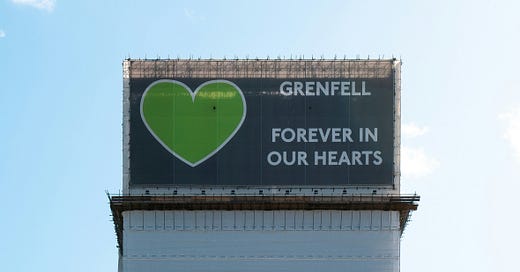Indian man's neck tied with rope, Grenfell inquiry ends and other stories from Black, Asian an Arab communities in the UK you shouldn't have missed this week - curated by Melissa Sigodo.
"This week has been nothing but a final nail in the heart” - my opinion on the Grenfell inquiry
Good evening,
Thank you for subscribing to The Thread and being patient with me.
Also, thank you for your messages of support yesterday. It really touched me to that some of you felt the urge to reach out. That really warmed my heart.
Also, thank you to those of you who signed up for the paid subscription in the last couple of weeks. I truly appreciate your support.
There’s so much to cover this week so I won’t waffle on. As promised, here is this week’s opinion by me.
The Longer Read
Grenfell: Launching inquiries is how Britain responds to crisis. But how it helps those who lives are destroyed remains to be seen.
Editor of The Thread Newsletter - Melissa Sigodo - Saturday September 7, 2024 - The Thread
Inquiries promise to comb through every inch of failure with millions of pounds pumped into the process. Victims relive their traumas hoping it will lead to justice but unfortunately, the outcome rarely goes further than serving to highlight how injustice was allowed and will continue for years to come.
We’ve had the Covid inquiry, the Infected Blood inquiry, the Post Office inquiry and despite inquiry after inquiry, all it seems to demonstrate is that people with power can ruin the lives of others with little to no consequence.
Victims of the Windrush scandal are still frozen in time, awaiting compensation and sadly, reports show there is another Windrush-type-scandal in the making. We had the Macpherson inquiry following the racist murder of Stephen Lawrence, which found the Metropolitan Police to be institutionally racist back in 1999. Yet decades later, the Baroness Casey Review found the same.
Ironically, the purpose of an inquiry is to prevent the same horror from repeating itself but often times, another report, review or inquiry rears its ugly head years later, revisiting more or less the same issue. To nobody’s surprise, it then shows that nothing was learned, and the situation hasn’t changed or is markedly worse. The recommendations that come from these expensive reviews are only viewed as polite requests for change which means they rarely stand a chance at ever being fully followed through.
Now we have the second and final part of the Grenfell inquiry which came to an end this week. After seven exhausting years, many bereaved and survivors felt they had waited to be told something they already knew. A total of 72 people including a child as young as two-years-old, died as a result of greed, dishonesty and indifference.
This week, I spoke to and heard the experiences of the immediate family members and friends of those who were killed in the fire, who expressed their anger and pain at the torment of the last seven years.
From reading reports in the news showing their homes on fire, to dealing with the PTSD from watching people waving and screaming from the tower for help - Grenfell survivors and bereaved have lived through all of this while displaced, shifting from hotel to hotel, trying to be happy.
After seven years of mourning, some of the bereaved take solace in the afterlife and how they hope to see their loved ones again to tell them they fought for justice. While for others, surviving the fire has left them searching for answers and a purpose in life. One man who has since lost his job with his mental health deteriorating, told me how he questioned why he lived instead of his friend and her two-year-old son as he had left their flat shortly before the fire broke out. While another woman says she still texts her deceased husband’s phone number, sending him pictures of her grandchildren longing for a reply.
For all the inconsolable grief they’ve felt, the families were handed 10kg of words detailing why their loved ones deaths were avoidable. Profit was placed above people’s lives, and in the case of Grenfell Tower, 85 percent of them were Black, Brown and immigrant people. However, the inquiry did not look at how racism played a part despite calls for it to - another bitter failing.
Now, after years of being held captive by the process, the only justice they hope this inquiry will lead to is a legal one, as families and campaigners have called for criminal charges against those responsible. However, that may only happen in 2030, according to a former chief prosecutor.
After nearly a decade of pain, the bereaved are expected to wait for six more agonizing years to pass before they find out if justice will be served. A daunting prospect that has left some questioning whether they’ll live to see the day.
With all this in mind, it’s difficult not to find inquiries painfully meaningless. Instead, they seemingly function as a prolonged torture method for those who are already traumatised and hurting.
As for preventing another Grenfell - many don’t believe it will be likely. As of last month, there are over 4000 buildings with dangerous cladding on them as only a mere 29% of the overall work to remove the flammable material has been completed in the last seven years. And only last month, one of those buildings caught fire in Dagenham, London.
So, if inquiries are meant to prevent disasters from occurring again, it doesn’t seem that this aim is being achieved, and it may be time to question whether matters of this magnitude should instead go directly before a judge. But knowing how the UK works, if there is ever any acknowledgement that inquiries have failed, they’ll probably launch an inquiry into the inquiries of the last 20 years.
But for those who have suffered an unbearable loss, this week has been nothing but a “final nail in the heart” for why it shouldn’t have happened in the first place.
I truly hope that Grenfell won’t be another inquiry that simply gets filed away in the library of avoidable catastrophes. For the men, women and children who were killed in that fire as well as those still living in unsafe homes, they deserve justice and I hope it is well and truly served one day.
Health
Netflix’s Love Is Blind UK star Demi Brown shared her battle with the “shame” of endometriosis and how it took seven years to get diagnosed with the chronic inflammatory condition that causes tissue similar to the lining of the uterus to grow on different areas of the body causing severe back pain, nausea and heavy bleeding. At one point, Demi says she believed she was having a miscarriage because of her symptoms. Full story.
Hundreds of healthcare staff walked out for 48 hours over an escalating pay dispute. The workers who are employed to provide personal care such as feeding and bathing patients are often having to perform clinical tasks such as conducting electrocardiogram tests, their union has said. According to NHS guidance, these task should recieve a higher salary which could see an increase of £2,000. Full story.
Keep reading with a 7-day free trial
Subscribe to The Source to keep reading this post and get 7 days of free access to the full post archives.





